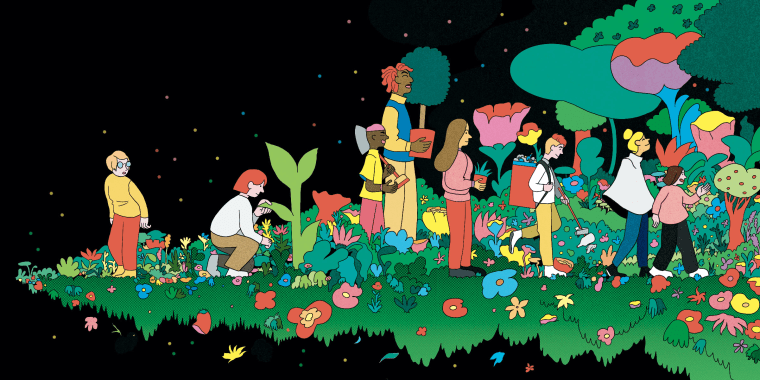As Earth Day approaches, TODAY is encouraging everyone to adopt One Green Thing and incorporate eco-friendly habits into their daily lifestyles. According to researchers, these simple lifestyles changes can also have a positive impact on your mental health.
Studies show that engaging in pro-ecological behavior (PEB) is tied to increased levels of personal well-being, said Dr. Tim Kasser, a psychologist and retired professor from Knox College in Galesburg, Illinois. Activities such as recycling, reducing consumption and even participating in environmental activism is positively associated with higher levels of happiness and satisfaction. The relationship is clear, but more research is needed to explain exactly why, Kasser explained.
“We can be confident that there is a positive relationship between PEB and personal well-being. We can’t yet be positive why that’s the case.”
Dr. Tim Kasser
One study found positive associations between satisfaction and the frequency of green activities, such as purchasing recycled paper products, shopping with a reusable bag, carpooling and walking or cycling. Another study tracked the general well-being of adolescents and adults and compared it to how frequently they performed 10 PEBs, including reusing paper and plastic bags. Once again, there was a positive correlation.
Kasser has studied the effects of pro-ecological behavior on mental health since the early 2000s, but said recent times have highlighted the importance of taking care of ourselves and our planet.
Personal health came into the forefront when the world paused because of the coronavirus. Social injustices and mass shootings prompted a heightened focus on mental health. Meanwhile, record-setting wildfires, hurricanes and temperature changes have demonstrated the need for more pro-ecological behavior.
In addition to engaging in pro-ecological behavior, studies have also shown the positive effects of spending time outside in green and blue spaces (i.e. lakes, estuaries, etc.).

Dr. George MacKerron, an economist and senior lecturer at the University of Sussex in Brighton, England, researched and studied how environmental quality affects our happiness. “We need (the environment) for all kinds of reasons, but one of them is for our direct mental health and happiness,” MacKerron said.
Other studies have shown that spending time in green spaces can protect against stress-related disorders, like depression and mood disorders. It can also help with psychological restoration and offer moments of rest and tranquility for overstimulated minds. Knowing that access to green space plays a large role in our mental health makes it that much more important for us to protect those spaces as much as possible.
Here are some easy pro-ecological behaviors you can start doing today:
1. Try "green purchasing"
Otherwise known as "environmentally preferable purchasing," this method is all about buying products that have a reduced negative effect on human health and the environment. In other words, try to be a bit more mindful about the things that you buy on a daily basis. Where was it made? Who made it? What is it made out of? Do I need it?
2. Spend time in green spaces
Whether it’s a five-minute walk or a whole afternoon, spending time in natural spaces boosts your mood and can provide psychological restoration.
3. Reduce overall consumption
Kasser touched on how difficult it can be to reduce consumption when living in a consumerist society. To start, try cutting down on plastic bag usage, thrifting instead of buying new, carpooling when possible or avoiding foods that have a harmful impact on the environment.
4. Engage in activities that support the environment
Activities like volunteering, signing a petition or attending an event can have an impact on the cause at large and lead to higher levels of well-being. "We need fundamental political, economic changes if we are going to keep global warming at less than 1.5% centigrade, achieve carbon neutrality and help the mass extinction currently happening on this planet," says Kasser. "This is why getting politically active is an important pro-ecological behavior; it will lead to to other broader societal changes."
What's your One Green Thing? Take this quiz to find some ideas and post your pledge on social media using the hashtag #OneGreenThing.
